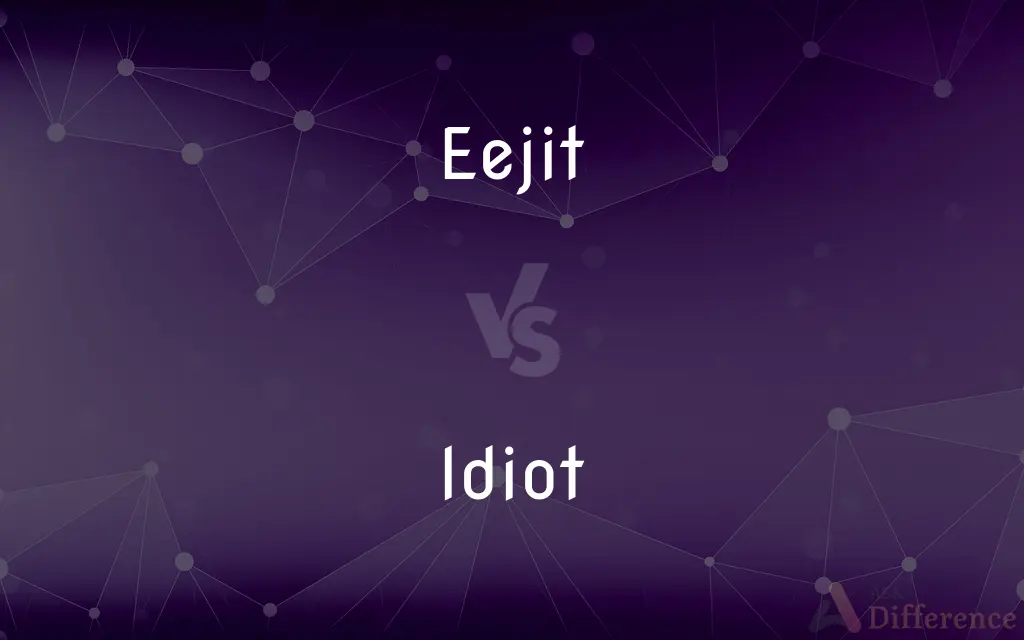Eejit vs. Idiot — What's the Difference?
By Tayyaba Rehman & Fiza Rafique — Updated on April 16, 2024
Eejit and idiot both denote a lack of intelligence, but "eejit" is a humorous, milder term mainly used in Irish and Scottish English, whereas "idiot" is more severe and widely used in American and British English.

Difference Between Eejit and Idiot
Table of Contents
ADVERTISEMENT
Key Differences
"Eejit" is a colloquial term predominantly found in Irish and Scottish English, used to describe someone acting foolishly in a relatively benign or endearing way. On the other hand, "idiot" is a more universally recognized insult that implies a higher degree of stupidity or lack of intelligence and can be perceived as more offensive.
While "eejit" often carries a light, teasing tone and is frequently used among friends and family without serious insult, "idiot" typically has a harsher, more derogatory connotation and can be quite insulting in social interactions across different English-speaking cultures.
The usage of "eejit" is particularly localized, suggesting a cultural acceptance of the term in a way that softens its impact. Conversely, the term "idiot" has broader usage across various English-speaking countries, lacking the specific cultural nuance that diminishes the severity of the term.
In media and literature, "eejit" is often employed to add a regional flavor, reflecting Irish or Scottish settings or characters, which helps in portraying cultural authenticity. Whereas, "idiot" is used more generally in English-speaking media worldwide to express disapproval of a character's actions or decisions.
Socially, calling someone an "eejit" can be seen as playful and is less likely to cause offense, particularly within the context of Irish or Scottish banter. On the other hand, "idiot" is more abrasive and can seriously offend, suggesting a significant lack of judgment or intelligence.
ADVERTISEMENT
Comparison Chart
Connotation
Mild, humorous
Harsh, derogatory
Usage Context
Mainly Irish and Scottish English
Widely used in American and British English
Tone
Playful, teasing
Insulting, critical
Cultural Significance
Reflects regional dialect and culture
Lacks specific cultural attachment
Likely Reaction in Social Settings
Generally accepted among peers, less offensive
Likely to offend, used with caution in social interactions
Compare with Definitions
Eejit
A term of endearment among friends.
Oh, you eejit, you've done it again!
Idiot
A term used to express frustration.
You're an idiot if you think that's going to work.
Eejit
Someone acting comically or out of ignorance.
You danced like an eejit at the party.
Idiot
Reflective of poor judgment.
It was an idiot move to challenge the boss publicly.
Eejit
A playful insult.
Only an eejit would say something like that.
Idiot
Someone making irrational decisions.
Only an idiot would invest in that scheme.
Eejit
A foolish person.
He locked his keys in the car like an eejit.
Idiot
A severe insult regarding one's capabilities.
Calling him an idiot was a bit harsh.
Eejit
A light-hearted rebuke.
Stop being such an eejit and take this seriously.
Idiot
A person of low intelligence.
He acted like an idiot during the meeting.
Eejit
A stupid person; an idiot
Don't stand there like a gormless eejit!
Idiot
An idiot, in modern use, is a stupid or foolish person. 'Idiot' was formerly a technical term in legal and psychiatric contexts for some kinds of profound intellectual disability where the mental age is two years or less, and the person cannot guard themself against common physical dangers.
Eejit
An idiot; a fool; an imbecile.
Idiot
A stupid person.
Idiot
A person who is considered foolish or stupid.
Idiot
A person with profound intellectual disability having a mental age below three years and generally unable to learn connected speech or guard against common dangers. The term belongs to a classification system no longer in use and is now considered offensive.
Idiot
(pejorative) A person of low general intelligence.
Idiot
(pejorative) A person who makes stupid decisions; a fool.
We think that people who cycle without a helmet are idiots.
Idiot
A person of the lowest intellectual standing, a person who lacks the capacity to develop beyond the mental age of a normal four-year-old; a person with an IQ below 30.
Idiot
(uncommon) idiotic, stupid
Idiot
A man in private station, as distinguished from one holding a public office.
St. Austin affirmed that the plain places of Scripture are sufficient to all laics, and all idiots or private persons.
Idiot
An unlearned, ignorant, or simple person, as distinguished from the educated; an ignoramus.
Christ was received of idiots, of the vulgar people, and of the simpler sort, while he was rejected, despised, and persecuted even to death by the high priests, lawyers, scribes, doctors, and rabbis.
Idiot
A fool; a simpleton; - a term of reproach.
Weenest thou make an idiot of our dame?
Idiot
A person of subnormal intelligence
Common Curiosities
Are these terms interchangeable?
They are not strictly interchangeable as "eejit" has a lighter, more localized connotation compared to the more universally harsh "idiot."
Can "idiot" be used playfully like "eejit"?
While "idiot" can sometimes be used playfully, it is usually more offensive and should be used with caution.
Where is "eejit" most commonly used?
"Eejit" is most commonly used in Ireland and Scotland.
What is a safer alternative to "idiot" if I want to avoid offending someone?
Using lighter terms like "silly" or "foolish" can convey disapproval without strong offense.
Is "eejit" understood outside of Ireland and Scotland?
It may be understood due to media and cultural exchanges, but it is not commonly used outside of these regions.
Is "eejit" offensive?
"Eejit" is generally not considered very offensive; it's often used humorously or affectionately.
What does calling someone an "idiot" imply?
It typically implies that the person is behaving in a way that shows a significant lack of intelligence or common sense.
Why might someone prefer to use "eejit" over "idiot"?
"Eejit" can express disapproval in a lighter, less offensive manner, particularly in casual or friendly contexts.
What are the origins of "eejit"?
"Eejit" is derived from an Irish pronunciation of the English word "idiot."
How does media influence the use of "eejit"?
Irish and Scottish media often use "eejit" to convey a local setting or character, enhancing cultural authenticity.
Can "idiot" be considered a serious insult?
Yes, "idiot" can be a serious insult and is often taken as a strong derogatory statement about someone's intelligence.
Does the severity of "idiot" vary by context?
Yes, the severity can vary by context, with the term being more offensive in serious or formal conversations.
How does the use of "idiot" differ in American versus British English?
The term is similarly harsh in both dialects, though the frequency and context of use might vary slightly based on cultural norms.
Could someone be legally reprimanded for calling someone an "idiot"?
Depending on the context and jurisdiction, such as in a workplace, this could potentially be seen as harassment.
Is "eejit" accepted in professional settings?
While it might be used lightly in casual professional interactions within Ireland or Scotland, it's generally not appropriate for formal settings.
Share Your Discovery

Previous Comparison
Cola vs. Kola
Next Comparison
Blast vs. ExplosionAuthor Spotlight
Written by
Tayyaba RehmanTayyaba Rehman is a distinguished writer, currently serving as a primary contributor to askdifference.com. As a researcher in semantics and etymology, Tayyaba's passion for the complexity of languages and their distinctions has found a perfect home on the platform. Tayyaba delves into the intricacies of language, distinguishing between commonly confused words and phrases, thereby providing clarity for readers worldwide.
Co-written by
Fiza RafiqueFiza Rafique is a skilled content writer at AskDifference.com, where she meticulously refines and enhances written pieces. Drawing from her vast editorial expertise, Fiza ensures clarity, accuracy, and precision in every article. Passionate about language, she continually seeks to elevate the quality of content for readers worldwide.
















































